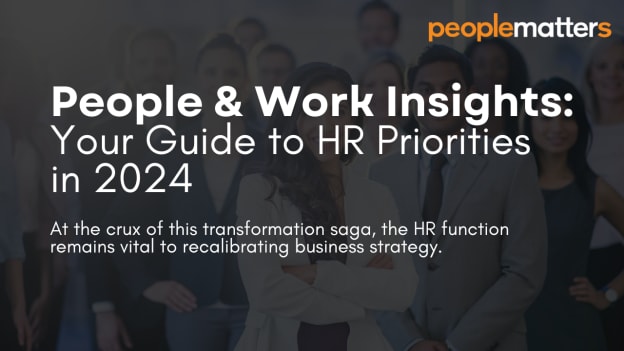Why 2024 is the year HR will hit the fast lane to transformation

In 2023, the world was simply taking ChatGPT for a test drive. In 2024, we are headed for the fast lane – that's just one of the many insights presented in People Matters People & Work Insights 2024, a compilation of the most salient trends in business, technology and culture, which are set to influence HR priorities.
Central to this narrative of transformation is the pivotal role of the HR function in aligning its strategies for the good of the business and its people.
By examining pertinent data, People Matters mapped out opportunities and challenges, with the goal of empowering leaders with insights to guide them in the next 12 months.
We ask our community: will 2024 become a watershed moment for leaders in the space of people and work?
Insight 1: To lead change, develop your employees’ adaptability quotient
It’s one thing to recognise when the world is in rapid flux. It’s another to be able to think on your feet and re-strategise while you live through the uncertainty of transformation. How does drastic change influence team morale and productivity? It weighs heavily on the minds of leaders and managers. Data from Gartner revealed73% of HR leaders say leaders and managers are not “equipped to lead change”.
The same trend is echoed in the results of a Gallup study of managers who reported feeling ‘stressed and disconnected’ from their organisations because of the following changes:
• 64% say employees were given additional job responsibilities
• 51% say their teams went through restructuring
• 42% say their teams went through budget cuts
“The volume and pace of change is overwhelming for employees,” says Peter Aykens, vice president of Gartner’s HR practice. “Organisations must plan ahead for ‘change fatigue risks’ and build fatigue management into their plan to drive successful transformation.”
People Matters Forecast: In 2024, the emergence of new AI technology and the continuing economic downturn and political tension across regions will likely influence business and talent decisions. To navigate these changes successfully, organisations will need to develop their employees’ adaptability quotient – their capacity to keep pace and make sense of change in real time. Without building people’s adaptability quotient, the continuous shift in tech, culture and processes can harm well-being and have devastating impacts on business goals.
Insight 2: To prepare for tough times, develop managers to be unafraid of difficult conversations
Periods of transformation are not without friction. Set against the backdrop of global economic and political unrest – ranging from a potential recession and climate change, to ongoing wars in Ukraine and the Middle East – the atmosphere of 2024 may be no different from that of the pandemic years.
Global unrest is prompting stakeholders to pose difficult questions.
With the trend of employee activism on the rise, questions from internal and external stakeholders about how a company is responding to social justice movements are inevitable. In some instances, an issue may become so polarising that team members who work closely every day might suddenly find themselves on opposite sides of a debate – with managers caught in the middle.
“Employee conflict resolution is the next must-have skill for managers,” Gartner advises. “With upcoming elections, geopolitical crises, labour strikes, climate change and pushback to DEI efforts, the environment is ripe for differences of opinion.”
People Matters Forecast: Disagreements – stemming from a diversity of perspectives – are inevitable in a dynamic organisation, especially one that fosters a speak-up culture. In 2024, progressive organisations will benefit from training their managers on how to navigate dissent with sensitivity and empathy towards different members of the team and create a shared sense of purpose.
Insight 3: To build a healthy corporate culture, encourage vibrant microcultures
The hybrid work trend continues to be a point of contention for organisations and workers, and this conundrum is expected to influence culture initiatives. In fact, the recent KPMG CEO Outlook Surveyfound 87% of CEOs aim to link rewards, raises or promotions with office attendance.
What’s missing from this debate is the question of purpose.
Prior to the pandemic, the office was a place for task completion. Today, it’s a place for establishing connections, says Justin Angsuwat, chief people officer of Australia-based employee experience specialist Culture Amp.
Creating what Angsuwat calls “commute-worthy” experiences on site can lead to teams having a healthy sense of FOMO, or fear of missing out, rather than a “begrudging sense of compliance”. These moments of connection, in turn, allow team members to develop microcultures – smaller networks of peers, within and outside teams, who bond over shared experiences, interests or location.
People Matters Forecast: In 2024, organisations that are intentional about fostering healthy and vibrant microcultures will thrive with their hybrid arrangement. Microcultures create the unique blend of personalities that give rise to the corporate culture as a whole.
With the right social interactions, as incentivised by team leaders, microcultures not only form the basis of employee resource groups – they also help resolve the perennial problems of employee disconnection and disengagement, and the lack of seamless collaboration in a remote or hybrid work setup.
Insight 4: To enhance your EVP, get creative with your talent strategy
Morale can suffer in a time of hardship. Amid inflationary pressures, for example, employees are seeing their purchasing power decline and their expenses add strain to their already tight budgets. In fact, 60% of workers are experiencing financial stress, according to data from PwC.
Meanwhile, people who are out of a job after a cycle of layoffs or exploring opportunities for a career shift often contend with traditional standards of hiring. Some examples are the requirement of a college degree or the expectation of a continuous career without any gaps in one’s work history. Outdated criteria pose setbacks for a segment of the workforce that have had limited or non-traditional employment opportunities.
Despite a grim outlook, HR leaders have the opportunity to ensure their organisations provide a unique and attractive value proposition to employees and candidates. They can continue to offer opportunities for career growth even in a time of slowdown by being creative with their talent acquisition, development and compensation strategies.
People Matters Forecast: In 2024, organisations that nurture candidates and employees will invest in three strategies to enhance their EVP:
Earned wage access: Innovative companies are now providing on-demand pay through EWA, a system that allows earned wages to be withdrawn by workers ahead of traditional payout schedules to ensure they have a reliable fund line.
Skills-first hiring: Employers are starting to unlock previously untapped talent pools and evaluating candidates on their skills, not simply their credentials. In LinkedIn’s Future of Recruiting report, about eight in every 10 recruiters in APAC forecast skills-first hiring would become the preferred talent acquisition strategy of their companies going into 2024.
Atypical, non-linear career paths: Atypical, non-linear careers are growing in popularity because talent are now choosing to have greater freedom over how they work, for whom and for how long. Analysis from Gartner points out that trends within this larger shift are due to rising retirement ages, mid-career breaks, shifts across industries, and the rise of contingent work and other non-traditional employment models.
As with hiring, employers will have to “design adaptive career paths that align business needs with employees’ larger goals, interests and skills,” Aykens of Gartner writes.
Insight 5: To leverage AI efficiently, upskill your people to use AI responsibly
A year after we first witnessed the potential of generative AI interfaces, such as ChatGPT and Copilot, we’re now seeing more clearly how they are poised to improve productivity at the organisational and individual level.
In 2023, we were simply taking ChatGPT for a test drive.
In 2024, we are headed for the fast lane.
What made the explosion of GenAI unique was how it made AI accessible to all levels of the value creation chain. Experts are already seeing change for the better. In a study from MIT Sloan, GenAI reportedly improved highly-skilled workers’ performance “by as much as 40% compared with workers who don’t use it”.
However, for businesses to truly leverage AI, the digital economy requires the world’s workforce to adapt to new demands. This places upskilling and reskilling at the top of the business and talent agenda.
People Matters Forecast: As AI is changing the way we work, organisations will undergo a transition that entails a massive overhaul of the world’s talent ecosystem, with a focus on upskilling and reskilling, in 2024. However, beyond simply raising productivity as a key outcome of upskilling, business and HR leaders must address how to use AI responsibly.
With GenAI still in its infancy, questions on its true impact on society continue to arise. For this reason, a multi-sectoral and multi-disciplinary approach – in which governments, businesses, academia and civil society collaborate to tackle concerns around job displacement, upskilling and ethics – is necessary to understand how the costs will balance out the benefits. Korn Ferry states four criteria to consider when weighing the benefits and risks of AI: compliance with AI, talent needs and skill gaps, privatisation, and the impact on reputation.
“GenAI outputs are hardly error-free, creating a strong need for data governance, quality control and good employee judgement. To avoid reputational, regulatory and legal issues, ensure your teams have access to training to develop judgement around not just information validity, but also how and when to use GenAI,” Gartner advises.
Conclusion
The year 2024 opens up uncharted terrain for many of us. As with every transformation cycle, however, the willingness of business and HR leaders to map out the landscape of opportunities and venture boldly into these unfamiliar territories can spell the difference between success and failure.
It’s no longer a question of when organisations are taking their first step towards change – the time is now – but it’s a question of why and for whom we are making this period of transformation possible. •
















